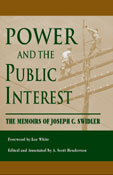Power and the Public Interest
The Memoirs of Joseph C. Swidler

- Author(s): Swidler, Joseph C.
- Series:
- Imprint: Univ Tennessee Press
- Publication Date: 2002-06-28
- Status: Active
- Available in Hardcover - Cloth: Price $30.00 | Buy Now
Joseph Swidler (1907–1997) was one of the last New Dealers, part of a generation of talented professionals—including Harry Hopkins, Harold Ickes, and Morris Cohen—who devoted their energies to serving public, not private interests. In a career spanning six decades, he helped craft and administer the nation’s energy policy while witnessing most of the signal events of the modern age: the Great Depression, World War II, the Cold War, and America’s emergence as a superpower. Swidler’s memoir is filled with insights on this transformative period of U.S. history and includes anecdotes about key historical figures, among them David E. Lilienthal, Harold Ickes, Lyndon B. Johnson, John F. Kennedy, and Nelson Rockefeller.
In 1933, Swidler, a young Chicago attorney, signed onto the Roosevelt administration’s efforts to implement New Deal economic reforms. As general counsel to the Tennessee Valley Authority, he did much to define the basic parameters of power regulation in the United States. His twenty-five years at the TVA were interrupted by World War II service in the Department of Justice, the War Production Board, and the Navy.
Asked by President Kennedy in 1961 to chair the Federal Power Commission (now the Federal Energy Regulatory Commission), Swidler, in just four years, transformed that moribund and inefficient agency into one of the best of the U.S. regulatory commissions. Later, he presided over a similar turnaround during his tenure as Chairman of the New York State Public Service Commission.
Between his lengthy stints in government service, Swidler practiced law privately in Nashville and Washington, D.C. But it was as a public servant that he had the most impact, using his sharp intellect and get-it-done style to construct a national energy and utility policy that considered the needs of the consumer as well as those of the producer—a balancing act that is especially relevant in the current climate of energy shortages.
The Editor: A. Scott Henderson, assistant professor of education at Furman University, is author of Housing and the Democratic Ideal: The Life and Thought of Charles Abrams.
